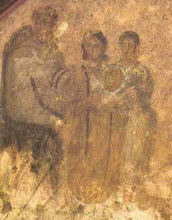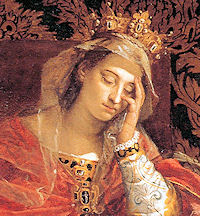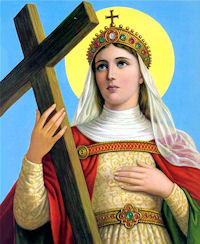Ordinary Time: August 18th
Saturday of the Nineteenth Week of Ordinary Time
» Enjoy our Liturgical Seasons series of e-books!
Old Calendar: St. Agapitus, martyr; St. Helena, widow
According to the 1962 Missal of St. John XXIII the Extraordinary Form of the Roman Rite, today is the feast of St. Agapitus, a martyr of Palestrina, not far from Rome. His cult, which is very ancient, was particularly popular in the eternal city where Felix III (492) caused a church to be built in his honor. Ancient inscriptions show clearly the great confidence placed in the intercession of this martyr. It is also the feast of St. Helena, empress and mother of Constantine the Great. She discovered the True Cross in a rock-cistern near Mt. Calvary.
St. Agapitus The Office offers these legendary details: "Agapitus was only fifteen years old but already his heart was all aglow with the desire to die as a martyr. Upon orders from the Emperor Aurelian (ca. 257), he was mercilessly whipped with leaded scourges, then thrown into a vile basement to remain there four days without food. After further punishment under the lash, he was suspended head downwards over a smoldering fire so that he should die from the smoke; boiling water was dashed against him, and his jaws were battered. When wild beasts hesitated to harm him, he was beheaded with the sword."
The Office offers these legendary details: "Agapitus was only fifteen years old but already his heart was all aglow with the desire to die as a martyr. Upon orders from the Emperor Aurelian (ca. 257), he was mercilessly whipped with leaded scourges, then thrown into a vile basement to remain there four days without food. After further punishment under the lash, he was suspended head downwards over a smoldering fire so that he should die from the smoke; boiling water was dashed against him, and his jaws were battered. When wild beasts hesitated to harm him, he was beheaded with the sword."
Excerpted from The Church's Year of Grace, Pius Parsch.
Things to Do:
- A boy of fifteen years a full-fledged hero! Has he any lesson for modern youth? Of you Christ is not demanding such suffering, neither blood nor death. But He is demanding a will that can say NO to the allurements of sin, a will that can bend itself humbly in obedience. In this you have opportunity to be a youthful hero.
St. Helena It was the pious boast of the city of Colchester, England, for many ages, that St. Helena was born within its walls; and though this honor has been disputed, it is certain that she was a British princess. She embraced Christianity late in life; but her incomparable faith and piety greatly influenced her son Constantine, the first Christian emperor, and served to kindle a holy zeal in the hearts of the Roman people. Forgetful of her high dignity, she delighted to assist at the Divine Office amid the poor; and by her alms-deeds showed herself a mother to the indigent and distressed.
It was the pious boast of the city of Colchester, England, for many ages, that St. Helena was born within its walls; and though this honor has been disputed, it is certain that she was a British princess. She embraced Christianity late in life; but her incomparable faith and piety greatly influenced her son Constantine, the first Christian emperor, and served to kindle a holy zeal in the hearts of the Roman people. Forgetful of her high dignity, she delighted to assist at the Divine Office amid the poor; and by her alms-deeds showed herself a mother to the indigent and distressed.
In her eightieth year she made a pilgrimage to Jerusalem, with the ardent desire of discovering the cross on which our blessed Redeemer suffered. After many labors, three crosses were found on Mount Calvary, together with the nails and the inscription recorded by the Evangelists. It still remained to identify the true cross of Our Lord. By the advice of the bishop, Macarius, the three were applied successively to a woman afflicted with an incurable disease, and no sooner had the third touched her than she arose, perfectly healed. The pious empress, transported with joy, built a, most glorious church on Mount Calvary to receive the precious relic, sending portions of it to Rome and Constantinople, where they were solemnly exposed to the adoration of the faithful.
In the year 312 Constantine found himself attacked by Maxentius with vastly superior forces, and the very existence of his empire threatened. In this crisis he bethought him of the crucified Christian God Whom his mother Helena worshiped, and kneeling down, prayed God to reveal Himself and give him the victory. Suddenly, at noonday, a cross of fire was seen by his army in the calm and cloudless sky, and beneath it the words, In hoc signo vinces—"Through this sign thou shalt conquer." By divine command, Constantine made a standard like the cross he had seen, which was borne at the head of his troops; and under this Christian ensign they marched against the enemy, and obtained a complete victory. Shortly after, Helena herself returned to Rome, where she expired, 328.
Excerpted from Butler's Lives of the Saints
